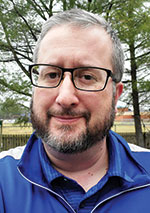The Eucharist: God’s Greatest Gift
Sight Unseen / Brandon A. Evans
The ghostly grace of adoration

I struggle with eucharistic adoration.
As a belief that I only came to in adulthood, the reality of the Eucharist is much more challenging in practice than in intellectual assent.
I just don’t know what to do in adoration or what I’m supposed to be getting out of it. It isn’t natural to me, and I don’t understand why it’s so special to people.
After all, there are small chapels the world over where people are praying, crying, reading, singing, even sleeping. People who are sitting in serene silence.
There are grand eucharistic processions where so many seem transfixed, their eyes aglow with love and wonder.
There must be something there. This is the Church’s greatest treasure laid out before us.
But I can’t see it. I can’t see him. Prayer, focus, imagination, they all fail in the end. Nothing seems to make any connection.
I stay but a few minutes in adoration and leave with the burdens I brought in: the expectation that my own efforts could force success and the expectation that I’d get something for it.
There is advice I’ve heard multiple times before, though, that seeks to remedy such a sorrowful, selfish ailment: that you ought to realize when sitting in the presence of the exposed Eucharist, grace comes into your soul as sunshine would warm your skin on a summer day. You walk away glowing with his divine light.
Still, I find that even such a beautiful analogy limps. It’s too strong for me. Not all things that come from the sun are so bright and obvious.
Neutrinos are tiny particles blasted out of our star in such quantity that they are more numerous than anything else in the universe. 100 trillion of them hit our body every second. And all of them pass right through. They are so slight—so insignificant—that they continue on through the Earth as though it wasn’t even there.
But every great once in a while one of these “ghost particles” strikes an atom in our body and interacts with it. Yet there is no change in us, no notice given. Life carries on.
Such an event in the world of grace is different, though. Doing great things with the nearly imperceptible is one of God’s favorite tricks, and Christian history is absolutely filled with his ability to pull it off.
When I sit before the Blessed Sacrament, it’s not my imagination or holiness or even belief that matter. It’s not my own efforts, nor does the sun have to beam blindingly. I just have to be there.
And in doing so, that ghostly grace works in its own way. Most of it may pass through without notice, on its way to someone or somewhere else, but it’s no worry.
It is exactly in not expecting anything—in being happy with the smallest portion and delighting in sensing no effect—that peace is found.
Peace that when I sit, unaware, some little, little, part of God’s life may strike my own as a small seed planted to lie dormant until its time, or as a silent power nudging my path ever so slightly in another direction.
The grace of God does not need a bounty: amidst that flow of invisible light bursting forth from every monstrance there is something of it that will find you, even if you walk out of the door disheartened.
God smiles, because he has worked what he intended, and given you what you needed.
You just might not know it yet.
(Sight Unseen is an occasional column that explores God and the world. Brandon A. Evans is the online editor and graphic designer of The Criterion and a member of St. Susanna Parish in Plainfield.) †
